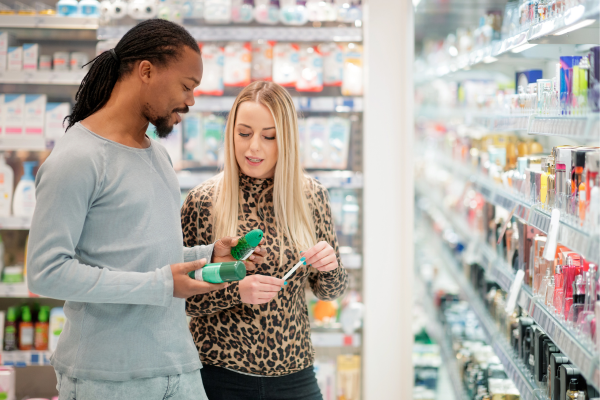August 08, 2023
Learn if the beauty products you use could cause kidney damage.
Beauty products can be used in a variety of ways. Some people are empowered by them, while others may feel like these products hide their true selves. Regardless of how you use or view cosmetics, it's important to be mindful of the different ingredients they use. It’s up to us to learn about potential risks associated with the products and make informed choices about what we apply to our bodies.
Key takeaway
Many beauty products contain ingredients that could cause health issues. However, the dosage, exposure period, and how you are exposed all determine whether the user experiences adverse side effects. Staying informed, reading product labels, and seeking guidance from healthcare providers is the best way to prioritize your well-being when incorporating new products into your beauty routine.
Did you know that 1 in 3 Americans are at risk of kidney disease? Take this one-minute quiz to find out if you are one of them.
1. Deep chemical peels or phenol peel
The term “chemical phenol peel” currently has over one billion views on TikTok, with users giving the treatment rave reviews for its ability to remove wrinkles, treat some forms of acne, and create smoother skin. But what is it? A chemical peel uses a chemical solution to remove layers of the skin.
There are three types:
- Light: Removes the first layer of skin
- Medium: Removes first and middle layers of skin
- Deep: Removes all three layers of skin
What are the risks associated with chemical peels?
What users may not know are the risks associated with the treatment. The risks are mild for light and medium chemical peels, including redness, infection, and scarring.1 Deep chemical phenol peels, however, pose a much higher risk due to one of their key ingredients: carbolic acid or phenol.
Phenol is known to cause issues with the heart and may damage the liver and kidneys since they are responsible for processing and excreting the chemical.1,2 As such, people with heart, liver, or kidney issues should not receive phenol peels.2 Regardless of preexisting conditions, everyone should speak with a healthcare practitioner before getting a phenol chemical peel to ensure they are healthy enough for the procedure.
Have questions? Contact NKF Cares, our patient information center.
2. Some anti-aging creams
You can find creams, lotions, serums, and more, boasting their ability to remove wrinkles and fine lines while improving complexion. While ingredients like Vitamin A (retinoids), Vitamin C, and some acids have been shown through research to provide some of these benefits, many products’ promises are not backed by science.3,4
What are the risks associated with some anti-aging creams?
In most cases, users only risk choosing the wrong product for their skin type resulting in dry skin, breakouts, or inflammation. However, the FDA has been made aware that some anti-aging creams contain mercury, a toxic heavy metal that can cause many health problems, including kidney damage.5
While the FDA does not allow significant amounts of mercury in cosmetics, these products and ingredients do not need FDA approval before entering the market. As such, some anti-aging products containing unsafe levels of mercury make it onto shelves (especially on e-commerce sites) and are used until the FDA is alerted to their potential health risks.
Check labels for:
- Mercurous chloride
- Calomel
- Mercuric
- Mercurio
- Mercury
Since not all products will put mercury on their label, check the FDA’s list of known brands containing mercury.
The best way to avoid fake anti-aging claims and mercury-filled products is by enlisting the help of a board-certified dermatologist. They can help create a safe skincare routine for you.
Join the NKF Blog Newsletter
Get inspirational stories and kidney disease resources delivered to your inbox every month. You'll gain practical insights and expert advice to help you better understand and manage your kidney health no matter where you are on your kidney journey. Subscribe today.
3. Skin-whitening creams
Skin-whitening creams are used across the globe to make darker skin appear lighter. Many people of color experience discrimination due to their skin tone. As such, some may wish to lighten their appearance to better-fit Colorist constructs in which lighter-skinned people receive privileges.6,7
What are the risks associated with skin-whitening creams?
Many skin-lightening creams cause health issues because they contain high levels of mercury and hydroquinone. Mercury exposure can lead to mercury poisoning and kidney damage.7 Long-term exposure to hydroquinone can also damage the kidneys and liver.8
Socially, the existence and advertising of these products negatively affect the mental well-being of people of color and perpetuate racist ideals of beauty. These products are not recommended for use due to the physical and emotional damage they create.
Learn more about social determinants of health and their effect on kidney health.
4. Hair straightening treatments
Hair-straightening treatments are used to change the texture of hair, making it straighter. These products primarily target people of color and rely on natural hair discrimination which people with natural hairstyles like afros, locs, and braids face. Sadly, this discrimination remains rampant in the workplace, school, and public spaces.
A recent study9 of 2,990 women who identified as Black, Hispanic, white, or multiracial/multiethnic found that:
- Black women’s hair was two and a half times more likely to be considered unprofessional.
- More than half of the Black women surveyed felt they had to wear their hair straight in a job interview to succeed. A quarter of the Black women surveyed believe they were denied a job because of their hair.
- One-fifth of the Black women surveyed between the ages of 25 and 34 had been sent home from work because of their hair.
To avoid this discrimination, some people chemically straighten their hair.
What are the risks associated with hair straightening treatments?
In years prior, hair straightening treatments used formaldehyde. Due to the dangers of formaldehyde, it has been banned in many countries and replaced with glycolic acid derivatives.
This move makes hair straightening treatments appear safer but glycolic acid derivatives may release formaldehyde when they come into contact with high temperatures. If breathed in or absorbed by the skin, formaldehyde can lead to various health problems, including kidney damage. A 2023 case study10 also found that glycolic acid absorbed through the skin may lead to the formation of oxalate, which can cause acute kidney injury. While this case study was small, it is important to know about these possibilities. Learn more about acute kidney injury.
Everyone deserves equal access to healthcare. By advocating for KIDNEY EQUITY FOR ALL™, we are helping to create a healthcare system that values diversity, promotes inclusion, and ensures that everyone has an equal chance at a healthy life, regardless of ethnicity or cultural background.
5. Some nail polishes
Many people love doing their nails because it lets them showcase their personality, engage in fun self-care, and follow the ever-changing fashion trends associated with nail art. Nail polish is an easy way to boost self-confidence and participate in nail art communities, but not all nail polishes are created equal.
What are the risks associated with some nail polishes?
Some nail polishes contain potentially harmful chemicals like dibutyl phthalate and toluene. Long-term exposure to dibutyl phthalate11 may cause kidney damage, and toluene12 can hurt the kidneys if swallowed. While most people are not intentionally consuming nail polish, this could become an issue for nail biters. To avoid these chemicals, check nail polish labels before purchasing. Recent attempts to remove these chemicals from nail polishes should mean you’ll still have plenty of options to choose from.
Share your story
Can your kidney disease be attributed to the use of a particular product? Share your story with us–it may be the one that gives others with kidney disease hope.


















